Covid-19 and Halloween: Lockdown means witches' coven 'can't meet'
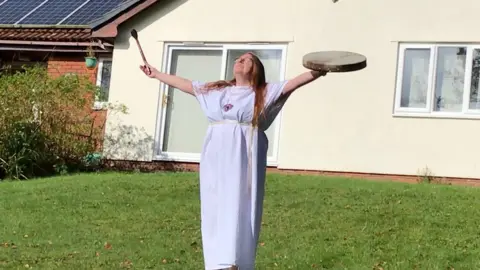 Claire Pingel
Claire Pingel The pandemic has meant all kinds of sports, social and religious groups cannot meet - but spare a thought for a witches' coven.
Karin Rainbird, a pagan prison chaplain, recently helped start a seven-strong Wiccan coven in Pontypridd, Rhondda Cynon Taf.
But she says she is the only "initiated" member and the other new witches need face-to-face training.
"Wicca is not really something you can do online," she said.
Wales is currently in a 17-day "firebreak" lockdown, with people staying at home while pubs, restaurants, hotels and non-essential shops remain shut as part of steps aimed at halting the spread of coronavirus.
And Covid-related restrictions have made it difficult throughout the pandemic for any kind of multi-household group wanting to meet in person.
"Because we just started the coven, no-one is initiated yet apart from myself, so it's really the training period," added Karin, who is also a freelance psychologist.
"Training would be practical. It would be doing the sabbaths [gathering to perform rites], having some workshops where we practise casting the circle, identify herbs, that kind of thing."
While witches scarcely get a mention outside of Halloween, Karin's coven is just one of many across the UK.
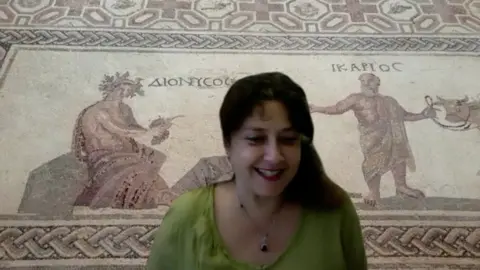 Karin Rainbird
Karin RainbirdIn 2011, census figures showed as many as 85,000 people identified in the UK with the neo-pagan movement, which is primarily represented by Wicca and witchcraft religions.
Wicca, also termed Pagan Witchcraft, is a modern pagan religion and just one form of modern witchcraft. It focuses on being in balance with the natural world.
For most people, the word "witch" might conjure images of women on broomsticks, bubbling cauldrons, the Sanderson sisters from Hocus Pocus or maybe even Harry Potter.
And with Halloween celebrated on Saturday - albeit with different Covid-19 rules restricting activities such as trick or treating - people will be dressing up as these hideous and sometimes comical casters of spells and hexes.
But for many directly involved in modern witchcraft, the caricatures can be misleading.
What is Wicca?
"Wicca has three elements: magic and witchcraft, religious, and mysticism," said Karin.
"The most important thing to me is communion with the deity, with the goddesses and with the god.
"Personally, I very seldom do any kind of spell craft myself on my own. It's not really that important to me."
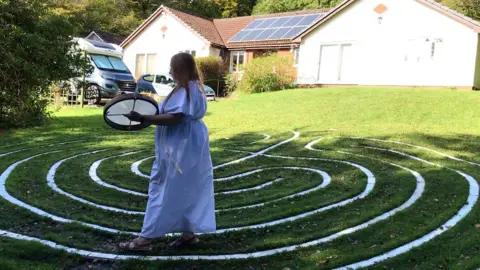 Claire Pingel
Claire Pingel Claire Pingel, 50, from Caerphilly, is also a pagan with coven experience. She said it took her a little while to realise it was the right path for her.
"I was brought up in Christianity and I went to church, but it didn't all sit well with me. There was just something else. I didn't know what I wanted."
After becoming a pagan, she met with some negativity. However, she said that, as the world has become more educated about neo-paganism, people have become more forthcoming.
"My family have actually become very respectful of it," she said. "They come to me for advice. They come to me when they're unwell and ask me for help."
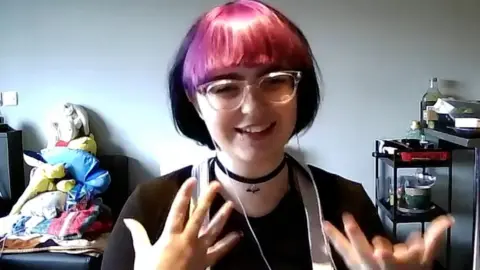 Tirion Morganna Hill
Tirion Morganna Hill 'You have to be spiritual'
Tirion Morganna Hill, a 19-year-old film student at the University of South Wales, grew up with paganism and is pagan herself.
She believes you have to be spiritual to be able to be a witch.
"You have to believe in something greater than yourself, ultimately. That inherently is a religious or spiritual ideology.
"A witch could be any religion. It doesn't matter what you believe, it's more about how you express your faith. Someone who is a witch is just someone who views and interprets prayer in a more action-based way."
And unlike some others, spell work is part of Tirion's practice.
"The last big spell I did was when the Black Lives Matter stuff was happening. I did a spell for racial justice," she said.
She said she used "natural elements" for that particular spell.
"Water, preferably moon water, and a branch - you basically do some chants about what you want to achieve.
"You pull the leaves off of the branch for each injustice that you think. You leave it there until you can put it in to a river. Being carried away is the symbolism for that."
'Witchcraft is not evil'
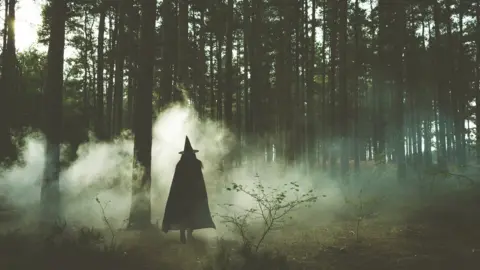 Colin Roberts
Colin RobertsFor Halo Quin, an author of a book on Welsh gods and goddesses, the term "witch" has been reclaimed in modern-day life, even if she has experienced some negativity during her practice.
"A lot of people just think I'm a bit weird. They think I'm anti-science, people have this association that, because it's not Christian, it must be anti-Christian, and therefore they think it's satanic."
But Halo's practice, like many others, is about working with the natural.
"Witchcraft is not supernatural. Witchcraft is not evil. It's not devil worship. It's none of those things. Witchcraft is a practice.
"It is working with the natural forces that we don't necessarily see on the surface. Witchcraft is operating in tune with your intuition and yourself."
And with the rise of social media witches, such as TikTok's "Witchtok", and Instagram's hashtags, it seems many more people are falling under the spell of witchcraft.
